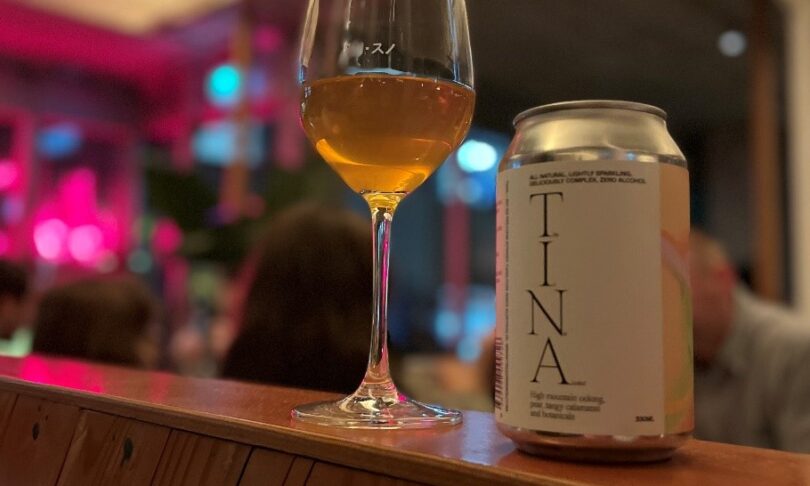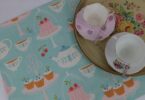Chrissie Trabucco and Imogen Hayes are people who like to have fun. Their friends like to have fun, too. But when those wasted days spent unpleasantly hungover started to add up, their solution wasn’t to throw the baby out with the booze and stop drinking altogether. Instead, the pair set out to create a deliciously unique zero alcohol drink that people could enjoy in any environment – particularly the fun ones. And without any hard and fast rules about how to consume it.
Non-alc. De-alc. Zero alcohol. Non-alcoholic. Whatever you want to call it, more and more people are making tasty drinks, sans the alcohol. And more and more consumers are drinking it.
Latest research by the IWSR predicts a 16 per cent increase in the volume of low and no-alcohol drinks in Australia by 2024.
But, it hasn’t always been that way.
Amy Armstrong says she “divorced” from alcohol in June 2020. It was winter in Port Fairy and her first mission was to find a really good replica red wine.
“The offering was pitiful,” she says.
“It was nothing.”
But, Amy has seen “incredible” changes in the industry since then.
Non-alc is being taken “really seriously”, she says.
So much so that Amy created a business to navigate the expansion of non-alcoholic offerings. Dry But Wet reviews drinks exclusively in the non-alc space and chats with creators about their craft.
“People just need to know where to get it, and what to get.”
While Amy initially thought Dry But Wet targeted sober people, the reality is that it’s attracting “anyone who just wants to drink less”.
And that growing demand for tasty zero alcohol drinks is forcing the improvement in the quality of what’s on offer.
“I get astounded every time I try one.”
Amy enjoys a good replica – drinks that look, taste and smell just like the real thing. But without the booze.
“The closer I can get to the real thing, the happier I am really.”
But, the non-alc space is bigger than replicas. People are bringing real fun, joy and creativity into the industry. Like Chrissie and Imogen’s brand T.I.N.A – an acronym for This Is Not Alcohol. Made in Victoria, T.I.N.A 1.0 has “floral and citrus aromatics with subtle tannin structure and a savoury, refreshing palate”.
Chrissie and Imogen wanted to make a drink that “stands up in its own right”.
A grown-up drink. And one that doesn’t taste anything like alcohol.
The duo set out to create a drink people could have in situations where alcohol is typically consumed – special occasions, a wine bar, a dinner party, after work evenings at home or late nights – without feeling like they weren’t “part of the experience”.
“You want to feel like you’re still celebrating and treating yourself to something sophisticated,” says Imogen.
For Amy, the success of the non-alc space is about the “complexities of the flavours”.
“It’s not just sweet. It’s not juice. Work has gone into it. A lot of thought has gone into it. And you can taste it.”
“It is being made to be sexy and fun.”
People like Imogen are using their knowledge of the liquor industry and applying it to non-alc.
“They’re doing it really, really well,” says Amy.
“And it’s selling really, really well.”
Imogen backs this up – T.I.N.A is “constantly out of stock and selling out”.
That’s despite some consumer expectation that non-alc drinks will be “the same price as a soft drink”.
“But it’s not a soft drink,” says Amy.
People put the inherent value in the alcohol, which is “ridiculous”.
“You could drink hand sanitiser if you really wanted to.”
Getting used to the cost of the non-alc space is about consumers developing an appreciation for the level of work and innovation involved in the process.
Non-alc drinks are using the best quality ingredients and “shoving a heap of them in there”, says Amy.
Like T.I.N.A 1.0. It’s made with the highest quality ingredients – calamansi, pear, organic botanicals and high mountain oolong tea leaves imported from Taiwan.
It’s “super low calorie, all natural, not sweet”, says Imogen.
But, the focus has never been about wellness for Chrissie and Imogen.
Aside from creating something that tastes really good, T.I.N.A is about inclusivity – whether someone is trying to cut back, but still drinks alcohol, whether someone has never been an alcohol drinker, or whether for their own reasons, they’re choosing not to drink anymore. No judgement here.
The social norm of drinking less is “gathering momentum”, according to a social marketing academic at Griffith University.
Dr Marie-Louise Fry specialises in moderate drinking of alcohol and echoes Amy’s experience in the earlier days of her sobriety.
“There just weren’t enough alternate products out there in the marketplace,” she says.
“Other than lemonade, or soda water.”
In more recent times though, Dr Fry has seen social movements coming forward that are “relevant to young people”.
There has been a “huge shift” in attitudes of living and enjoying a more broadly sustainable life that she says is “incredibly, incredibly powerful”.
“Life is a party and life is to be enjoyed.”
But, that shift has had to run its course and happen naturally. You can’t “force” social norms.
“You need the champions,” says Dr Fry.
Cool, adult, sophisticated offerings like T.I.N.A are giving people attractive options to naturally create a shift towards moderation.
The non-alc space is a “viable market” now and it’s going to continue to be viable moving forward, says Dr Fry.
“It’s just going to be more and more, and more.”
And Imogen agrees.
“It’s a good time for non-alcohol,” she says.
Chrissie and Imogen have big plans for the brand moving forward. It took them “a while” to create T.I.N.A 1.0 though.
“We’re a bit meticulous and finnicky,” says Imogen.
Let’s just hope it’s not too long between drinks.







